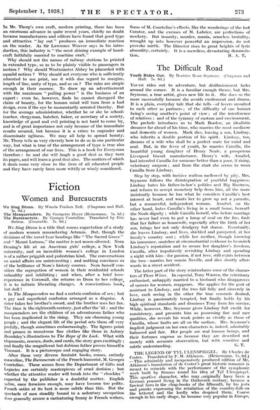Fiction
Women and Bureaucrats
We Sing Diana is a title that rouses expectation of a study of modern women remembering Artemis. But, though the divisions of the novel bear headings like " The Sacred Grove" and " Mount Latmos," the matter is not moon-silvered. Nora Deming's life at an American girls' college, a New York university, and an incredible women's college in London is of a rather priggish and pedestrian kind. The conversations on social affairs are uninteresting ; and nothing convinces us of the brilliance of Nora's history courses. Nora herself con- siders the segregation of women in their residential schools unhealthy and inhibiting ; and when, after a brief love- experience in Cornwall, she returns as Dean to her college, it is to initiate liberating changes. A conscientious book, but dull !
In The Masqueraders we find a certain confusion of sex ; but a gay and superficial confusion arranged as a disguise. A sister takes her brother's sword, and the brother uses her fan. The time is the eighteenth century, just after the '45 ; and the masqueraders are the children of an adventurous father who has been implicated in the rising. They are charming young people ; and the elegant life of the period sets them off very prettily, though sometimes embarrassingly. The figures point and prance in monstrous fine clothes like those in Aubrey Beardsley's illustrations to The Rape of the Lock. What with
elopements, rescues, duels, and cards, the story goes excitingly ; and finally the magnificent but dubious father proves himself a Viscount. It is a picturesque and engaging story.
After these very diverse feminist books, comes, entirely masculine, The Bureaucrats of the French humorist, M. Georges Courteline. These scenes from the Department of Gifts and Legacies are certainly masterpieces of cruel derision ; but whether the attentive reader will break into the " chuckles " expected by the publisher is a doubtful matter. English satire, once ferocious enough, may have become too polite.
French satire at its best is more subtle than this. But the spectacle of men steadily bound to a sedentary occupation does generally arouse a caricaturing frenzy in French writers.
Some of M. Courteline's effects, like the wanderings of the lost Curator, and the excuses of M. Lahrier, are perfections of mockery. But insanity, murder, mania, senseless brutality, wrought up into however powerful an impression, do not provoke mirth. The Director rises to great heights of lyric absurdity, certainly. It is a merciless, devastating denuncia-






























 Previous page
Previous page